Signs and Symptoms of PPPD
PPPD is characterized by chronic symptoms that are present most days for 3+ months. Key features include:
- Non-spinning dizziness: Unlike BPPV or Meniere’s, PPPD typically does not cause a true spinning vertigo. Instead, it’s more of a continuous dizziness, described as a sense of unsteadiness, rocking, or being on a boat. Some describe it as feeling like you’re moving when you’re not, or just a constant sense of imbalance.
- Postural instability: You might feel relatively fine when lying down, but the moment you sit up or stand (posture against gravity), the unsteadiness returns or worsens. Standing in one place can actually feel worse than moving. Many PPPD sufferers feel need to keep shifting or moving gently to feel stable.
- Perceptual hypersensitivity: Busy or complex visual environments provoke or worsen symptoms. For example, walking through a supermarket aisle with lots of items and people around can be overwhelming. You may feel disoriented in crowds, suffer “visual vertigo” watching fast-moving TV scenes, or feel off-balance in wide-open spaces with little visual reference.
- Worsening with motion: While there’s no acute vertigo, you often feel worse with movement – whether you’re moving (like walking or riding in a car) or things around you are moving. Quick head turns, bending over, or even scrolling on a phone might increase the dizziness or make you lightheaded.
- Fatigue and cognitive fog: Constant dizziness can sap your energy. It’s common to feel mentally foggy or have trouble concentrating, especially in environments that trigger symptoms. The effort it takes to appear “normal” and keep your balance can be exhausting.
- Anxiety and avoidance: Many people with PPPD develop anxiety, especially related to being in situations that provoke symptoms (like stores, driving, or busy social gatherings). Some also experience panic attacks, either as an initial trigger or secondary to the dizziness. Over time, you might start to avoid activities or places that you fear will make you feel worse, which unfortunately can shrink your world.
- Fluctuating severity: While symptoms are persistent, they’re not necessarily exactly the same all day. Mornings might be better and evenings worse (or vice versa). Stress, lack of sleep, or being sick with something else can intensify the dizziness. Conversely, if you’re deeply engrossed in an activity or relaxed, you might notice the symptoms less.
It’s important to note that PPPD is a diagnosis of exclusion – meaning other conditions are ruled out. By the time you have a diagnosis of PPPD, you’ve likely been through a battery of tests. The symptoms are very real and not “in your head,” though they do intertwine with stress and psychological factors in a complex way.
Impact on Your Life
Persistent dizziness from PPPD can be debilitating:
- Disruption of routine: What used to be simple, like taking a shower, can become a challenge if closing your eyes or the feel of water triggers unsteadiness. Many people have to modify daily routines – perhaps sitting down to do tasks they used to do standing (like cooking or showering with a seat), or taking frequent breaks due to the discomfort.
- Work limitations: If your job involves computer work, meetings, or moving about, PPPD can significantly impair performance. Screens might bother you; concentrating while dizzy is difficult. You might miss days or cut back hours. In some cases, people feel they can’t continue working until symptoms improve, which has financial and emotional implications.
- Driving and travel fears: Many with PPPD cut back or stop driving, especially if being in a car (as driver or passenger) heightens dizziness. Public transport can be equally challenging (standing on a moving bus or train is hard when you already feel imbalanced). Vacations or travel that involve unfamiliar busy places, airports, etc., can feel out of reach.
- Withdrawal from social life: Crowded restaurants, parties, shopping malls, or even family gatherings in busy houses can all spike symptoms. It often feels easier to stay home in a quiet, controlled environment. Over time, this leads to isolation. Friends might not understand why you keep saying no. Loved ones may struggle to grasp how you “always feel dizzy.” This invisibility of the illness can be frustrating and lonely.
- Reduced exercise and hobbies: If you enjoyed sports, dancing, or even simple exercise like walking, you might have stopped for fear of worsening the dizziness or due to discomfort. Many PPPD sufferers become sedentary, which can lead to deconditioning (loss of fitness) and actually perpetuate the problem. Hobbies requiring focus (reading, knitting, playing an instrument) might be less enjoyable if the dizziness intrudes. Life can feel like it’s on hold.
- Mental health toll: The constant nature of PPPD can wear you down. It’s common to feel depressed about the loss of your “normal” life and anxious because symptoms often worsen with stress, yet the symptoms themselves cause stress – a vicious cycle. There can be a lot of fear: “Will I ever get better?” On the flip side, because diagnostic tests often come back normal, some patients have been told nothing is wrong, adding to self-doubt or feeling misunderstood.
The overall impact is that PPPD can be just as disabling as other vestibular disorders, even though it doesn’t have dramatic vertigo attacks. The chronic, relentless dizziness affects every facet of life. But there is hope: with the right therapy and strategies, patients do improve, reclaiming their daily function and peace of mind.
Physiotherapy for PPPD at Peak Sports and Spine Centre
At Peak Sports and Spine Centre, we take a multidisciplinary and compassionate approach to treating PPPD. We know that PPPD sits at the crossroads of neurology, psychology, and physiology, so our program addresses all of these aspects to break the cycle of dizziness. Here’s how our physiotherapy for PPPD can help you:
- Vestibular Rehabilitation & Habituation: Even if your inner ears now test “normal,” your brain is in a state of heightened sensitivity. We design a custom vestibular rehab exercise program aimed at desensitizing your system. This often involves habituation exercises – activities that mildly provoke your symptoms, done in a controlled, repetitive way to teach your brain that these motions or environments are not actually dangerous. For example, if busy visual patterns bother you, we might start with a simple exercise like moving a checkerboard pattern in front of you while you keep balance, for short periods, gradually increasing exposure as you tolerate it. If walking in the grocery store is a nightmare, we might simulate that by walking in our clinic while moving your head or having some distracting background, and progressively make it more challenging. Over weeks, patients often report “the same activity doesn’t make me as dizzy as before” – a clear sign of habituation.
- Balance and Postural Strategy Training: We work on the physical aspects of balance to ensure you have a solid foundation. This includes exercises to improve your steady stance and automatic balance reactions. We might use balance boards, foam pads, or gentle pushes (perturbations) to help you practice regaining balance. We’ll also train ankle, hip, and stepping strategies – how your body naturally should respond to instability. As your balance confidence improves, that constant feeling of wobbliness can diminish. We also address posture, since many PPPD folks develop stiff, guarded postures (like rigidly holding onto something or keeping their neck very still). Through education and exercise, we’ll help you regain a more natural, aligned posture which in turn optimizes balance.
- Graded Exposure to Triggers: Beyond formal exercises, therapy sessions themselves will serve as exposure therapy to situations that challenge you. Early on, we’ll pick less threatening environments (maybe a quiet corner of the gym or a softly lit room). As you progress, we might do a session in a busier gym time or even outdoors. We could take you for a short supervised walk outside near traffic if that’s a goal, or have you practice in a simulated grocery aisle setup. This graded exposure, under the guidance of a supportive therapist, retrains your brain that these situations are safe. Each time you face a trigger and handle it successfully, your confidence grows – and we make sure to highlight and celebrate that success.
- Cardiovascular and Functional Exercise: It’s crucial to recondition the body. We will introduce gentle cardiovascular exercise, because research suggests consistent aerobic exercise can help reduce PPPD symptoms (possibly by calming the autonomic nervous system and improving blood flow regulation). For instance, starting with a recumbent bike or walking at a comfortable pace, even just 10 minutes, and then building up. We combine this with functional strength exercises (like squats, leg lifts, core exercises) so your body gets stronger and you feel more robust physically. Getting back into exercise also boosts endorphins and confidence. We’ll monitor that the exercise intensity stays within your tolerance – pushing just enough to improve fitness without flaring symptoms too much (a principle called pacing). Over time, you might start doing full workouts you hadn’t imagined possible when your dizziness was at its worst.
- Breathing and Relaxation Techniques: Because anxiety and PPPD are so intertwined, we incorporate stress-reduction into our sessions. We might start or end sessions with deep breathing exercises, guided relaxation, or even short mindfulness meditation focusing on body awareness. These techniques help reset an overactive fight-or-flight response. We teach you how to do diaphragmatic breathing (using the belly) which can be particularly helpful if you start to feel panicky or when you’re in a challenging environment – it’s a tool to settle your system. Some therapists might even use biofeedback techniques (like having you focus on a steady beat or using apps) to train your body to relax. A calmer nervous system often correlates with reduced dizziness.
- Education and Cognitive Strategies: We take time to explain what PPPD is – that it’s your brain’s surge protector stuck in the “on” position, misinterpreting certain inputs as danger when they aren’t. Understanding that your symptoms, though very real, do not signify harm can lessen their emotional impact. We also teach you how to respond when you feel a wave of dizziness: instead of freezing in fear, maybe you’ll learn to consciously relax your shoulders, breathe, and stay engaged in the activity. We sometimes borrow strategies from cognitive-behavioral therapy (CBT) – for example, helping you reframe negative thoughts (“I’m always going to feel this way”) into more positive or realistic ones (“I have felt this way for a while, but I am taking steps to improve, and I will likely feel better gradually”). If needed, we can refer you to a psychologist or counselor familiar with chronic dizziness, as combined physical and psychological therapy often yields the best results for PPPD.
- Progress Tracking and Motivation: PPPD improvements can be subtle week to week, so we use tools to track progress. This might be as simple as a symptom diary or standardized questionnaires on dizziness handicap and anxiety. Seeing scores improve over a month is very encouraging, even if day-to-day it’s hard to tell. In therapy, we also create little tests to show you improvement: maybe on week 1 you could only tolerate 30 seconds of a busy background image before symptoms rose, and by week 4 you handle 2 minutes – that’s concrete progress! We make sure you see those gains. We’ll also set homework exercises for you to do daily (consistency is key in PPPD recovery) and hold you kindly accountable. Knowing that you have some control – that your diligent practice is paying off – turns you from feeling victimized by dizziness to being empowered to overcome it.
- Holistic and Ongoing Support: We recognize PPPD recovery can take time. Our team remains patient, positive, and persistent. If you have setbacks (which can happen, say you get a cold or have a stressful week and symptoms spike), we frame it as a normal part of the healing curve and not a failure. We adjust the pace if needed but keep moving forward. We also liaise with your GP or specialist if needed – for example, if medication might help (some people benefit from SSRIs or other vestibular suppressants for a period, which is outside our scope to prescribe but we can coordinate on). We aim to be your coach, cheerleader, and knowledgeable guide all in one.
By addressing both the physical recalibration and the psychological coping aspects, our program gives you the tools to gradually reduce that persistent dizziness. Many patients with PPPD come to us feeling hopeless, only to find after several weeks that they’re doing things they avoided for months and feeling much more like themselves again. That transformation – celebrating someone reclaiming their life – is why we’re so passionate about what we do.
Let's get started — How can we help?
Physiotherapy
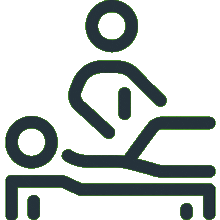
Chiropractic
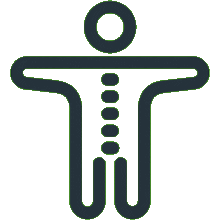
Podiatry
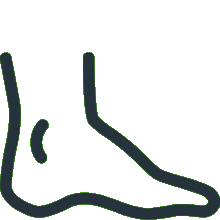
Massage Therapy
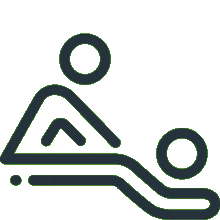
Women's Health Physiotherapy

Running Program Tailored To Your Goals
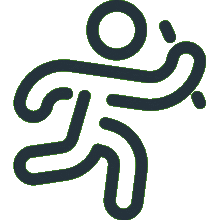
Joint Mobilisation

Active Release Technique
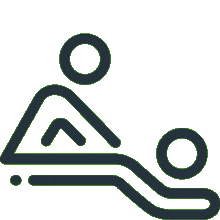
Exercise Prescription
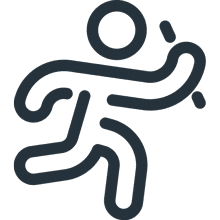
Real Time Ultrasound Imaging

Spinal Manipulation
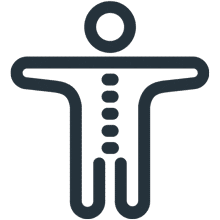
Functional Movement Screen
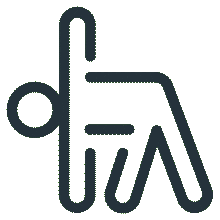
Knee Pain Treatment

Hamstring Strain Treatment
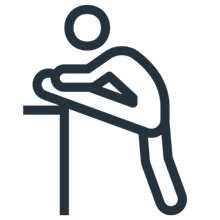
Hip Pain Treatment

Upper, Middle & Lower Back Pain

Neck Pain Treatment

Shoulder Pain & Rotator Cuff Tear

Can't find what you're after?
View all ServicesOr email the PEAK team at info@peakssc.com.au
Hawthorne
- Phone: (07) 3399 3318
- Fax: (07) 3319 6577
Address
5/171 Riding Road,Hawthorne, QLD, 4171 Get Directions
Opening Hours -
6 days per week
- Monday - Friday: 7:00 am - 8:00 pm
- Saturday: 7:00 am - 1:00 pm
To make a booking outside of business hours, please use our form by clicking here.
New Farm
- Phone: (07) 3399 4668
- Fax: (07) 3319 6577
Address
1/15 Lamington Street,New Farm, QLD, 4005 Get Directions
Opening Hours -
6 days per week
- Monday: 7:00 am - 8:00 pm
- Tuesday: 7:00 am - 8:00 pm
- Wednesday: 9:00 am - 8:00 pm
- Thursday: 10:00 am - 8:00 pm
- Friday: 7:00 am - 3:00 pm
- Saturday: 7:00 am - 3:00 pm
To make a booking outside of business hours, please use our form by clicking here.

